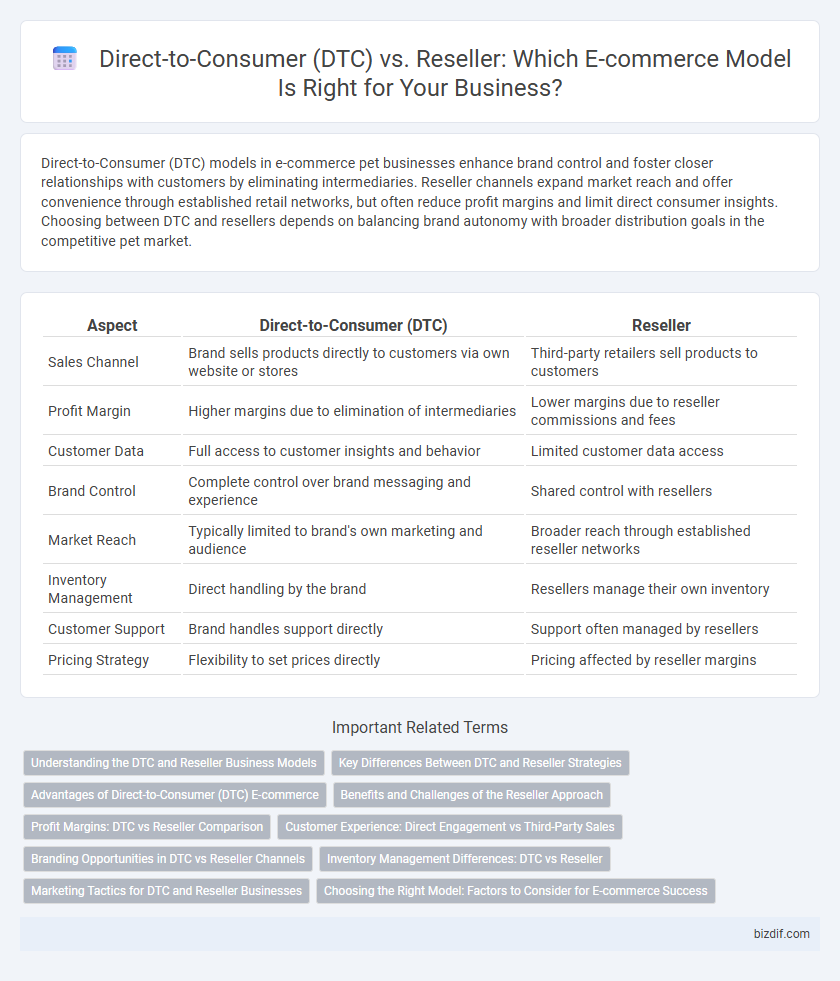Direct-to-Consumer (DTC) models in e-commerce pet businesses enhance brand control and foster closer relationships with customers by eliminating intermediaries. Reseller channels expand market reach and offer convenience through established retail networks, but often reduce profit margins and limit direct consumer insights. Choosing between DTC and resellers depends on balancing brand autonomy with broader distribution goals in the competitive pet market.
Table of Comparison
| Aspect | Direct-to-Consumer (DTC) | Reseller |
|---|---|---|
| Sales Channel | Brand sells products directly to customers via own website or stores | Third-party retailers sell products to customers |
| Profit Margin | Higher margins due to elimination of intermediaries | Lower margins due to reseller commissions and fees |
| Customer Data | Full access to customer insights and behavior | Limited customer data access |
| Brand Control | Complete control over brand messaging and experience | Shared control with resellers |
| Market Reach | Typically limited to brand's own marketing and audience | Broader reach through established reseller networks |
| Inventory Management | Direct handling by the brand | Resellers manage their own inventory |
| Customer Support | Brand handles support directly | Support often managed by resellers |
| Pricing Strategy | Flexibility to set prices directly | Pricing affected by reseller margins |
Understanding the DTC and Reseller Business Models
Direct-to-Consumer (DTC) business models involve manufacturers selling products directly to customers, allowing full control over branding, pricing, and customer experience, which can lead to higher profit margins. Reseller models rely on third-party intermediaries who purchase products and sell them to end consumers, often expanding market reach but reducing control over brand presence and pricing strategies. E-commerce platforms must evaluate these models based on factors like customer acquisition costs, supply chain management, and revenue streams to optimize sales channels.
Key Differences Between DTC and Reseller Strategies
Direct-to-Consumer (DTC) strategies grant brands full control over customer data, pricing, and brand experience by eliminating intermediaries, whereas reseller models rely on third-party sellers to distribute products, often resulting in less control over branding and customer engagement. DTC approaches enable personalized marketing, faster feedback loops, and higher profit margins as companies sell directly to end-users, while resellers often focus on broader market reach and volume sales through established retail partnerships. Key distinctions lie in relationship management, data ownership, and profit structure, which influence decision-making in e-commerce growth and scalability.
Advantages of Direct-to-Consumer (DTC) E-commerce
Direct-to-Consumer (DTC) e-commerce offers brands full control over their customer experience, enabling personalized marketing and direct feedback channels that enhance product development. By eliminating intermediaries, DTC models increase profit margins and allow for competitive pricing while maintaining brand integrity. Enhanced data collection through DTC platforms provides valuable insights into consumer behavior, driving targeted strategies and long-term customer loyalty.
Benefits and Challenges of the Reseller Approach
The reseller approach in e-commerce enables brands to leverage established distribution networks, expanding market reach without heavy upfront investment in customer acquisition. Challenges include reduced control over brand messaging and potential margin erosion due to intermediary fees. Brands must balance the scalability and convenience of resellers against the risks of brand dilution and inconsistent customer experiences.
Profit Margins: DTC vs Reseller Comparison
Direct-to-Consumer (DTC) models typically yield higher profit margins by eliminating intermediaries, allowing brands to retain full retail prices and control over pricing strategies. Reseller models involve shared margins, where profits are split between the manufacturer and third-party retailers, often resulting in reduced net revenue for the brand. DTC also benefits from direct customer data access, enabling optimized marketing spend and further margin enhancement.
Customer Experience: Direct Engagement vs Third-Party Sales
Direct-to-Consumer (DTC) brands provide a personalized customer experience by maintaining direct engagement through tailored communications, faster response times, and customized product offerings. In contrast, resellers often create a fragmented experience due to limited control over customer interactions, delayed feedback, and standardized services. This direct engagement in DTC models enhances customer loyalty and satisfaction by addressing individual preferences more effectively than third-party sales channels.
Branding Opportunities in DTC vs Reseller Channels
Direct-to-Consumer (DTC) channels provide brands with unparalleled control over customer experience, allowing for consistent messaging, personalized marketing, and stronger brand loyalty. In contrast, reseller channels dilute brand identity through third-party intermediaries, limiting direct customer engagement and reducing opportunities for tailored promotions. Emphasizing DTC strategies enhances brand equity by fostering authentic consumer relationships and capturing valuable first-party data for targeted growth.
Inventory Management Differences: DTC vs Reseller
Direct-to-Consumer (DTC) models maintain full control over inventory, allowing real-time tracking and rapid response to demand fluctuations, which optimizes stock levels and reduces overstock risks. Reseller businesses depend on third-party inventory information, often facing delays and discrepancies that complicate stock management and increase the likelihood of stockouts or excess inventory. Effective inventory management in DTC enhances customer satisfaction through faster fulfillment, while resellers balance inventory across multiple suppliers, impacting supply chain agility and cost efficiency.
Marketing Tactics for DTC and Reseller Businesses
Direct-to-Consumer (DTC) businesses emphasize personalized digital marketing strategies, utilizing social media advertising, influencer partnerships, and data-driven email campaigns to engage customers directly and build brand loyalty. Reseller businesses rely on broader wholesale marketing approaches, including trade shows, bulk discount promotions, and retailer partnerships to expand market reach through multiple sales channels. Leveraging customer data analytics and targeted content creation proves essential for DTC brands, while resellers prioritize strong distributor relationships and competitive pricing tactics to optimize sales performance.
Choosing the Right Model: Factors to Consider for E-commerce Success
Selecting between Direct-to-Consumer (DTC) and reseller models hinges on factors such as control over brand experience, profit margins, and customer data access. DTC allows e-commerce businesses to maintain complete ownership of customer interactions and higher revenue per sale, while reseller channels offer broader market reach with reduced operational complexity. Evaluating product type, target audience, and scalability potential is essential for e-commerce success when choosing the optimal sales model.
Direct-to-Consumer (DTC) vs Reseller Infographic

 bizdif.com
bizdif.com